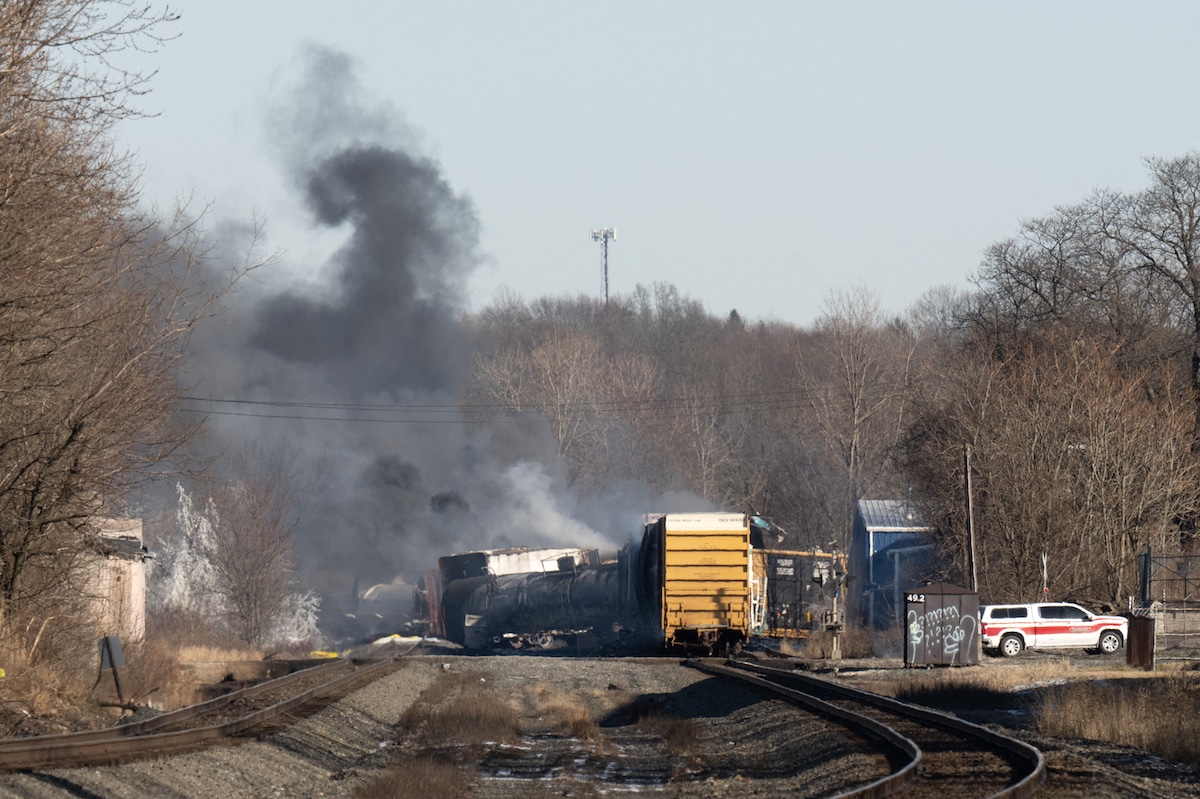Products You May Like
At around 9 p.m. local time on Friday, Feb. 3, a freight train transporting 20 cars worth of hazardous materials derailed in the town of East Palestine, Ohio, near the state’s border with Pennsylvania.
The derailment sparked a fire and forced 1,500 to 2,000 people to evacuate. It also raised concerns about the lingering public health and environmental impacts of the disaster as well as the safety of transporting hazardous chemicals via rail generally.
“The Palestine wreck is the tip of the iceberg and a red flag,” Railroad Workers United secretary and Amtrak locomotive engineer Ron Kaminkow said, as The Guardian reported. “If something is not done, then it’s going to get worse, and the next derailment could be cataclysmic.”
Kaminkow used to work for Norfolk Southern, the operator of the derailed train. The company is also one of the corporate donors to the “Cop City” development in Atlanta that would clear part of an urban forest, according to opponents of that project.
The more than 100-car train was traveling between Madison, Illinois, to Conway, Pennsylvania, when around 50 of the cars derailed, as AP News reported at the time. The train was carrying numerous products, including 14 cars worth of vinyl chloride, a chemical used in plastic production that has been linked to liver cancer risk.
More From EcoWatch
Evacuee Ann McAnlis said she learned about the accident when a neighbor texted her a photo.
“She took a picture of the glow in the sky from the front porch,” McAnlis told WFMJ-TV, as AP News reported. “That’s when I knew how substantial this was.”
In the immediate aftermath of the derailment, the U.S. Environmental Protection Agency (EPA) and Norfolk Southern took air quality readings to check for hazardous chemicals, and Mayor Trent Conaway said no dangerous readings were recorded in the one-mile evacuation zone.
On Monday, Feb. 6, officials chose to instigate a controlled release of vinyl chloride in order to avoid a more powerful explosion, as The Washington Post reported at the time. More people were ordered to evacuate or face arrest.
“You need to leave, you just need to leave. This is a matter of life and death,” Ohio Governor Mike DeWine said in a Monday press conference, as The Washington Post reported.
In addition to the vinyl chloride, the EPA also said it was monitoring for phosgene, a pesticide ingredient that was used as a chemical weapon during World War I, and hydrochloric acid, which can be generated during explosions.
No people were killed or injured in the initial accident, but non-human animals were not so lucky. The property where East Palestine resident Taylor Holzer kept various animals, including foxes, squirrels and tortoises, was inside the evacuation zone, and he was unable to rescue them, as Newsweek reported. The foxes, especially, were impacted by the chemicals, and one of them died after symptoms including diarrhea and difficulty breathing.
“He went downhill very fast,” Holzer told Newsweek. “He crashed so fast and unexpectedly. He wasn’t able to blink or function properly as he died in my arms.”
Dead fish have also been found in nearby waterways, as The Washington Post reported further.
Evacuation orders were lifted Wednesday after testing showed the air and water was safe, as CBS reported. However, some residents remain unsure.
“I’ve watched every news conference and I haven’t heard anything that makes me think that this is a data-driven decision,” 44-year-old East Palestine resident Maura Todd told The Washington Post. “We don’t feel like we have a whole lot of information.”
Todd said the air near her home still smelled like nail polish and burning tires and that she and her family were planning to relocate to Kentucky for the time being.
Todd’s family are among the residents to experience headaches and nausea following the incident, as WLWT5 reported. Two Pennsylvania residents have gone as far as to file a lawsuit against Norfolk Southern demanding that the train operator pay for medical tests and treatment for everyone within 30 miles of the accident.
Adding to long-term health concerns, First News reported Sunday that the EPA sent a letter to Norfolk Southern saying that three additional chemicals were present on the derailed train: ethylene glycol monobutyl ether, ethylhexyl acrylate and isobutylene.
Hazardous materials expert Sil Caggiano said it was possible cancer clusters would emerge in the area and it was worrying how quickly officials had moved to clear the rails.
“We basically nuked a town with chemicals so we could get a railroad open,” Caggiano said, as First News reported.
Even if no lasting damage is caused by the derailment — which investigators say was due to a broken axle — it raises concerns about transporting dangerous chemicals — including fossil fuels — by rail.
Around 4.5 million tons of dangerous chemicals travel the U.S. by train each year, and around 25 million U.S. residents live within the blast radius of oil trains, as The Guardian noted.
The transport of liquified natural gas (LNG) is especially risky. Under former President Donald Trump, the U.S. Department of Transportation allowed LNG to be carried by train with no extra safety rules, and the Biden administration has not yet issued a replacement regulation.
“We’ve been astonished by the effect that the spillage of five cars of vinyl chloride has had at the Pennsylvania-Ohio border, but that would be nothing compared to the effects of a similar derailment of LNG,” Natural Resources Defense Council senior attorney Kimberly Ong said, as The Guardian reported.
Meanwhile, Kaminkow said that the railway industry had paved the way for the East Palestine and future disasters by reducing both inspection staff and safety regulations.
“They have cut the hell out of the workforce, and there are big plans to cut it further,” Kaminkow said. “Just because the rail companies are profitable doesn’t mean they’re healthy.”
